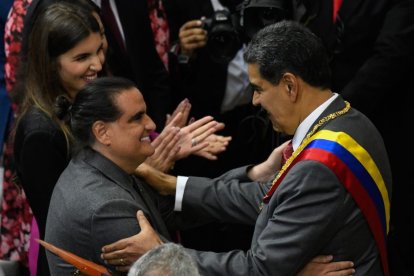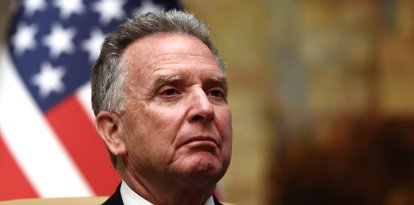Republican senators pressure Biden to publish evidence against Alex Saab, Maduro's figurehead pardoned in a prisoner exchange
“History should remember him as a predator of vulnerable people,” said high-profile lawmakers Grassley, Rubio and Risch.

(Cordon Press)
Several Republican senators are pressuring the Biden administration to publish Alex Saab's file, the controversial figurehead of the dictator Nicolás Maduro who was recently pardoned by President Joe Biden in a exchange for ten American citizens who were imprisoned in Venezuela, a fugitive Pentagon contractor and some Venezuelan political prisoners.
“History should remember him as a predator of vulnerable people,” says a letter obtained by Voz Media and signed by Republican senators Chuck Grassley, Marco Rubio and Jim Risch, all high-profile members of the Senate.
Letter from Republican senators sent to the DOJ over the Saab case by emmanuel.rondon on Scribd
“The United States government closed the case against Alex Saab when President Biden pardoned his crimes. There is no basis for withholding the evidence against Saab from the American public,” the letter states.
In the letter, Saab, 52, is identified as one of Maduro's main figureheads and the main connection between Venezuela and the Iranian regime. It is also said that Maduro's front man helped two oil-exporting countries circumvent U.S. sanctions. He laundered hundreds of millions of dollars through shell companies around the world.
Saab was pardoned by Biden while he remained in a federal prison in Florida awaiting trial on money laundering charges. Upon arriving in Caracas, after his release, the Venezuelan socialist dictator welcomed Saab who claimed he was allegedly tortured while awaiting extradition from Cape Verde.
Republican senators ultimately set a deadline of February 7 for Garland to release the requested files. In the letter they stated that Saab’s case records could reveal details about the front man's "confessions," a reference to his secret meetings with the DEA before the accusations against him were made official.
Saab's controversial release, which some claimed made the Biden administration look weak before the Venezuelan regime, occurred after the White House reversed the sanctions imposed by the Trump administration on the Venezuelan regime in 2018. That was shortly after Maduro was “re-elected” in an election branded as fake by the opposition. The international community and the vast majority of Venezuela supported the rise of Juan Guaidó as interim president of Venezuela.
After that process, the opposition's efforts to remove Maduro from power failed. Guaidó's political momentum faded and Washington, now with Biden in power, began a policy of rapprochement with Venezuela in search of, supposedly, supporting an electoral solution that critics believe is unrealistic.
In fact, in recent weeks, after an alleged electoral agreement signed in Barbados between the opposition and Maduro, the Venezuelan regime began a new series of persecutions against soldiers, civilians, journalists and allies of María Corina Machado, the new leader and face of the Venezuelan opposition. The Biden administration limited itself to condemning Maduro's attacks as worrying, without taking action on the matter.
RECOMMENDATION





















